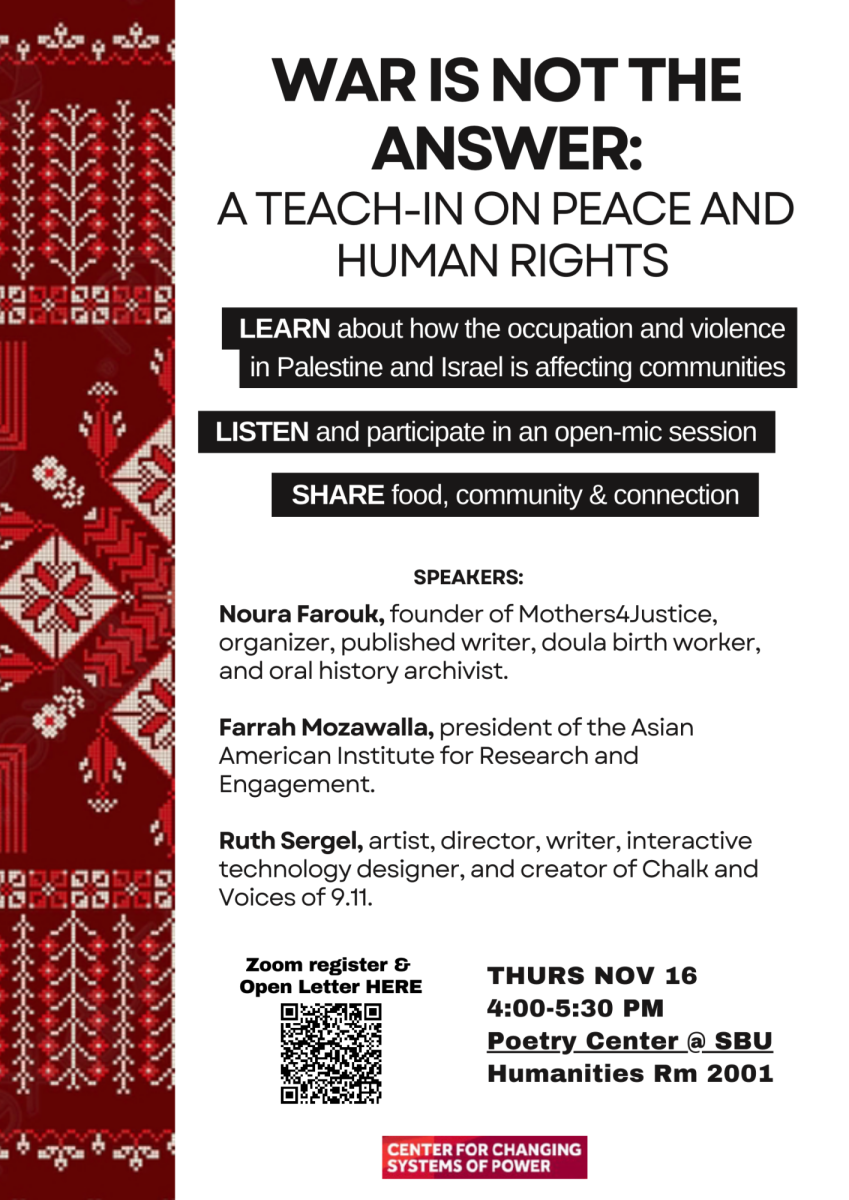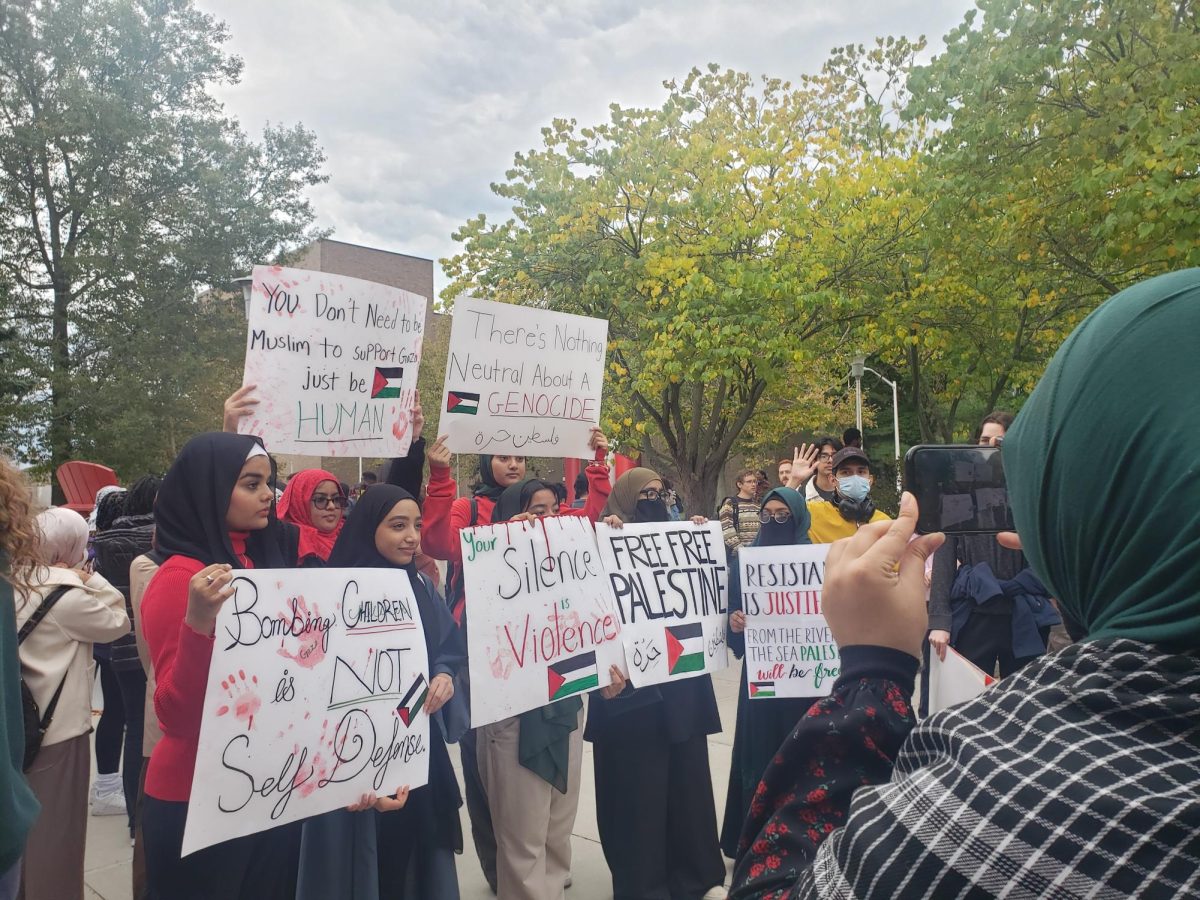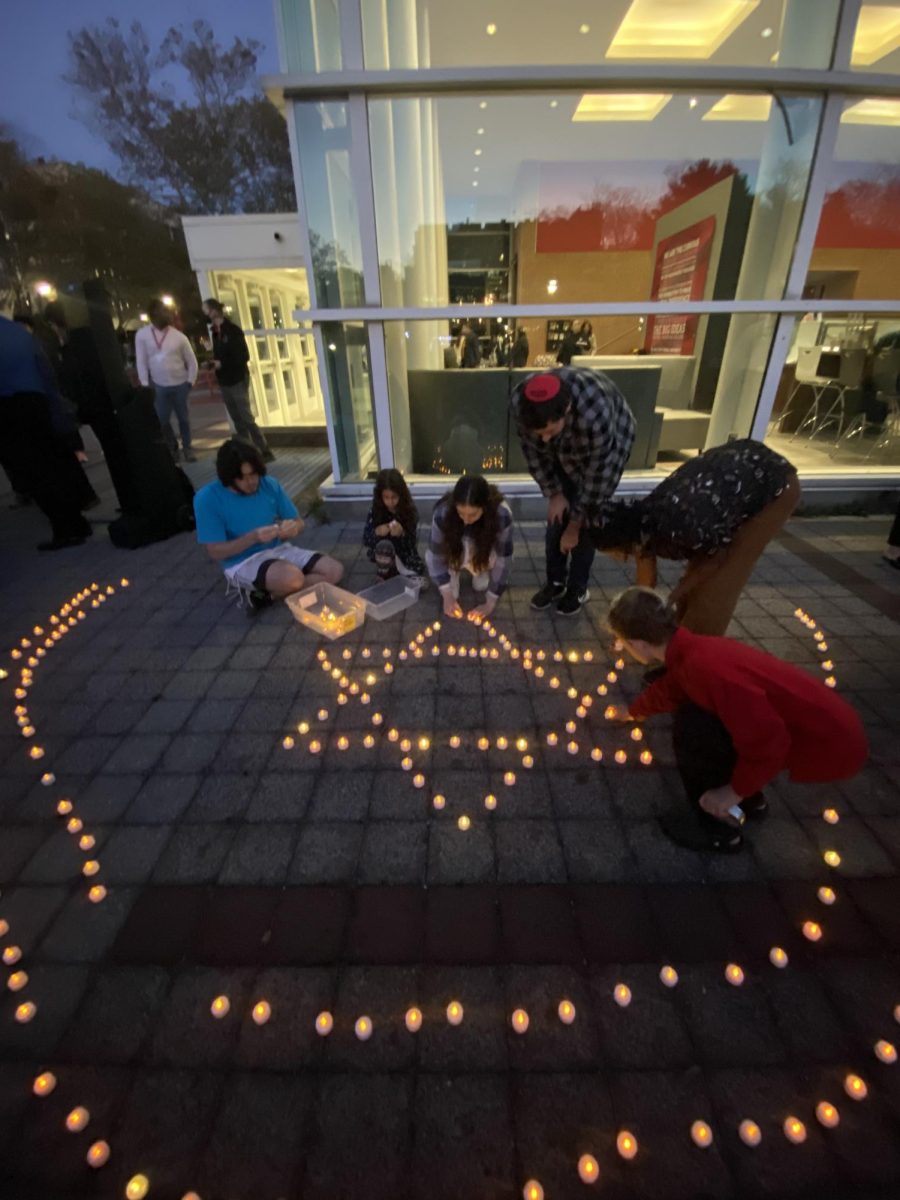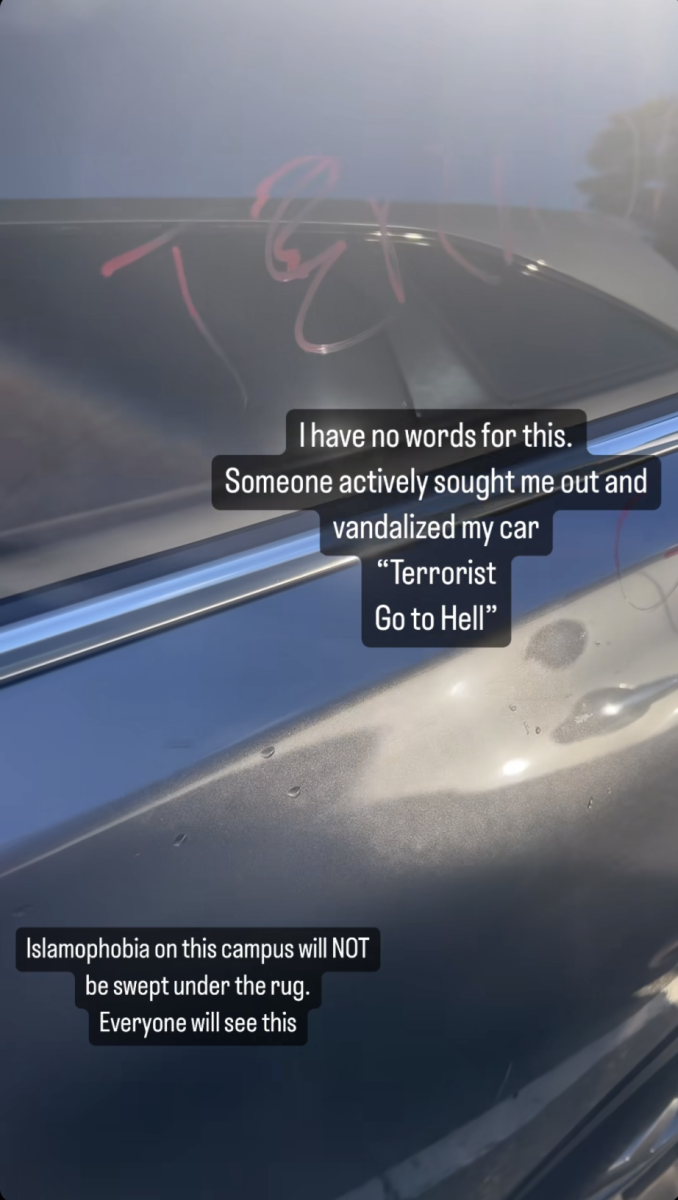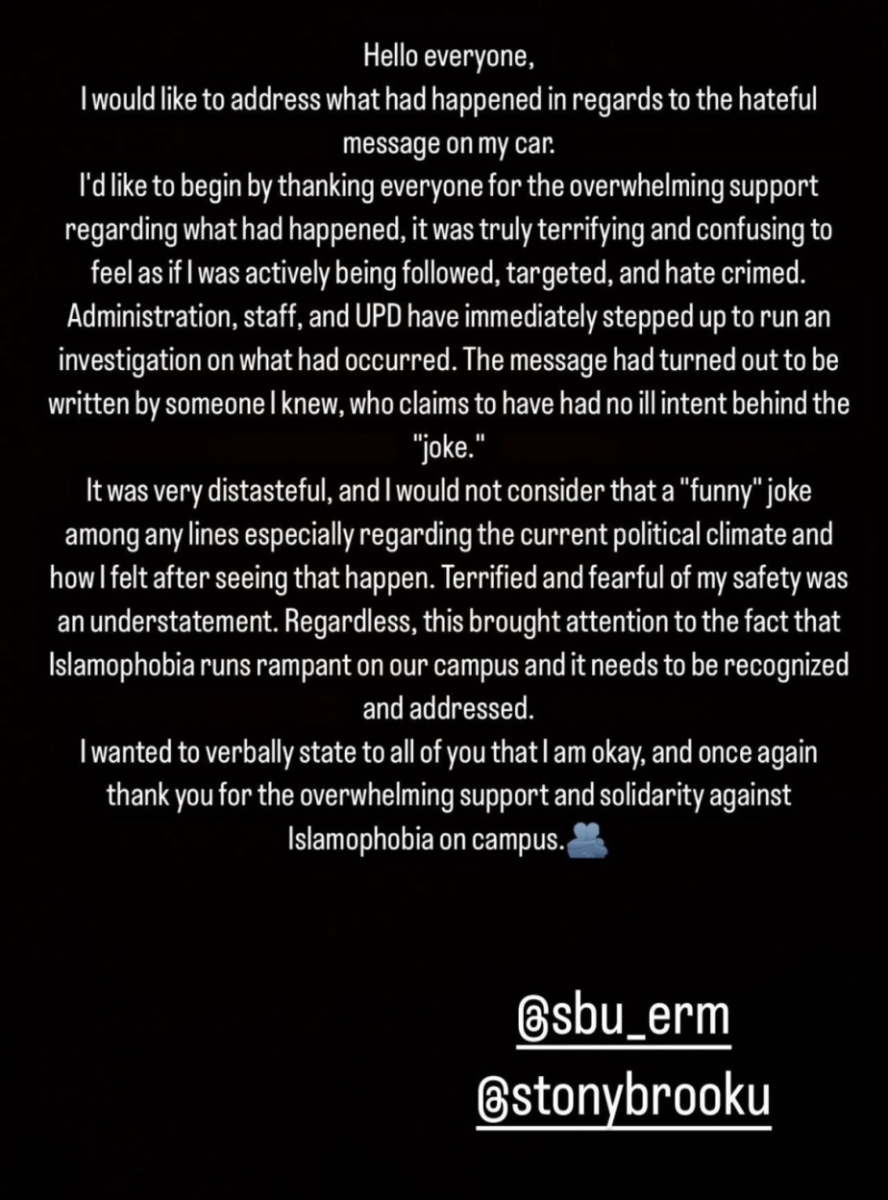How the Israel-Palestine conflict is playing out at SBU: a deeper look
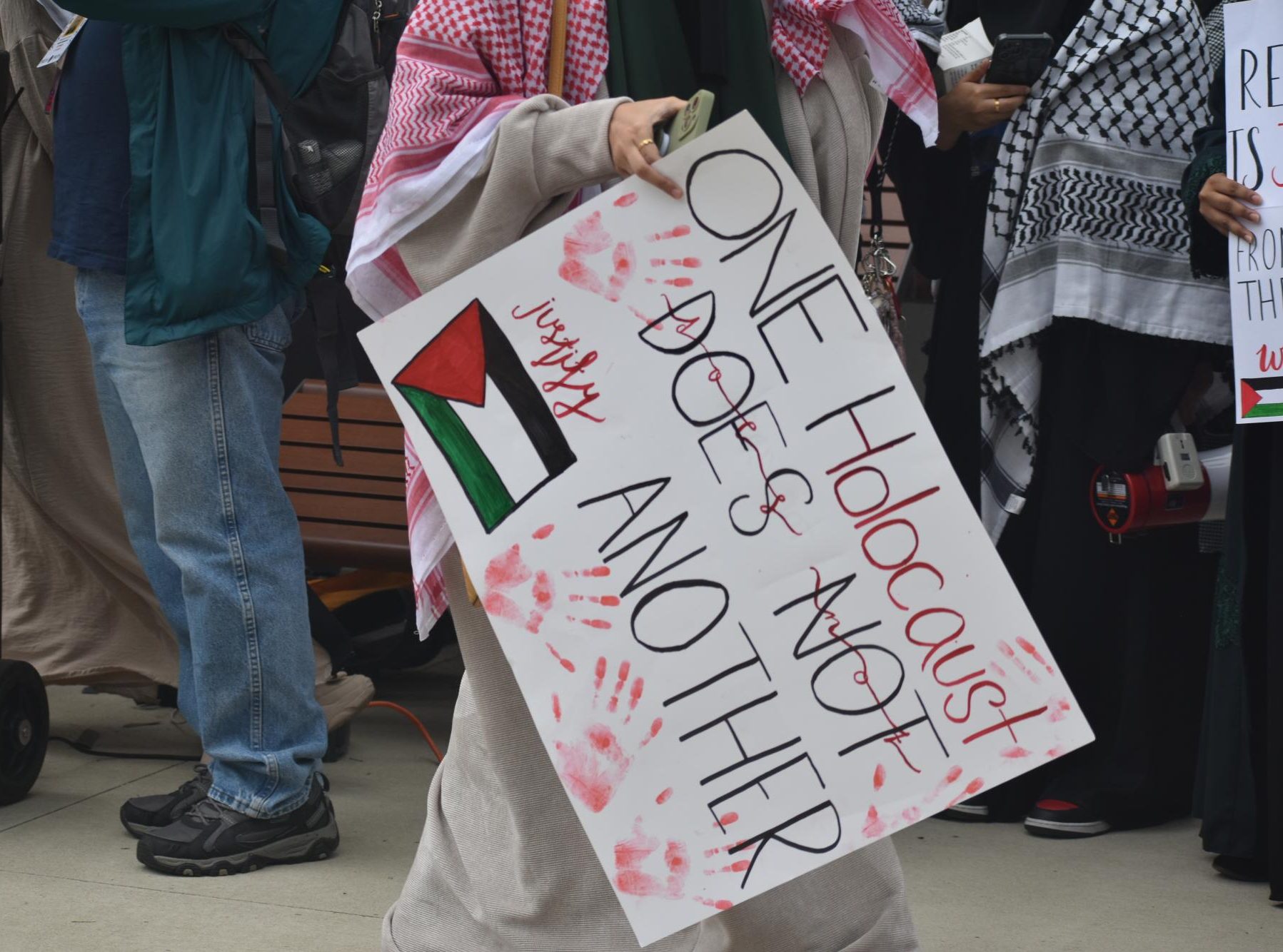
Major U.S. cities and college campuses are speaking out about the conflict taking place in Gaza and Israel, and Stony Brook University is no different.
Over the past month, Stony Brook students, administration and faculty have demonstrated their views on the current Israeli-Palestinian conflict that began Oct. 7 — both on and off campus. Students in particular have been discontent with the University’s response to the atrocities.
Faculty members plan to host an open mic event with the Center for Changing Systems of Power on Nov. 16 from 4-5:30 p.m. in the Poetry Center for a guided discussion among students, faculty, staff, alumni and community members to share their thoughts.
This is pure evil, and people are still finding ways to kind of justify using some sort of ambiguous, nebulous context.”
— Roy Harel
According to Reuters and Al Jazeera, the death toll of Palestinians in Gaza exceeds 11,000 people — including over 4,100 children — since the initial Oct. 7 Hamas attack. CNN reports that over 1,200 people have died in Israel.
Roy Harel, a senior history major, is very vocal about his stance on the ongoing war and actively advocates for Israel on his social media accounts. As the former president of Seawolves for Israel, an Israeli American Council (IAC) Mishelanu Fellow and current Hillel student leader, Harel is passionate about educating people on Israel’s side of the conflict.
“The biggest issue surrounding the current war that’s going on is that people are conflating the current situation in 2023 with some sort of wider historical narrative,” Harel said.
But for many other students, academics and advocates, context is crucial to understanding the complexity of this war and the media’s portrayal of it.
Israel occupied the Gaza Strip, Jerusalem and West Bank in the 1967 Arab-Israeli War. Since then, decades of bloodshed and disarray have preceded the Oct. 7 attacks.
But more Palestinian lives have been claimed in the past month alone than in the last 15 years.
Officially known as Harakat al-Muqawama al-Islamiya — translated as the Islamic Resistance Movement — Hamas is one of the Palestinian Territories’ prominent political parties and is classified by the United States Department of State as a terrorist organization.
“Hamas is unambiguously the evil side,” Harel said. “They’re putting Israeli civilians at risk. And they’re putting Palestinian civilians at risk. They don’t care about human life, and they don’t care about the fate of innocent people, regardless of their background.”
According to the Council on Foreign Relations, Hamas was founded by Sheikh Ahmed Yassin, a Palestinian cleric and activist within branches of the Muslim Brotherhood. This organization, founded in Egypt in 1928 by Islamic scholar and teacher Hassan al-Banna, was established with the goal of creating a universal Islamic ruling system that would reform existing political systems in the Middle East.
In 1998 the Hamas Covenant was published, outlining the implementation of an Islamic society in historic Palestine and the disbandment of Israel. The document asserts that the group, “strives to raise the banner of Allah over every inch of Palestine, for under the wing of Islam followers of all religions can coexist in security and safety where their lives, possessions and rights are concerned.” The movement claims its allegiance to Allah, “whose way of life is Islam.”
Hamas has been governing Gaza since 2007, two years after Israel withdrew from the territory. Prior to the 2023 attack, Israel and Palestine’s last deadly conflict occurred in 2021, with Hamas launching missiles into Israel and sparking an 11-day crisis.
Mohammed Deif, Hamas’ military leader, said Hamas went through with the Oct. 7 attack because of Israel’s occupation of Palestinian lands and the country’s alleged crimes against Muslim individuals.
-
Definitions:
- A political idea; a Jewish nationalist movement started by Theodor Herzl to create a Jewish state in their ancient homeland.
Judaism is a religion and Zionism is a political movement.
-
1917
- When WWI ended, the British took over Palestine from the Ottoman Empire. The British government issued the Balfour Declaration, which promised a place for Jewish people to live.
-
1922
- The League of Nations issued The Palestine Mandate to Britain, which led to the establishment of a Jewish homeland in Palestine through the Balfour Declaration, which went into effect in 1923.
- Palestinians were never consulted on this decision, but Zionists were asked about their vision for Palestine, which was included in the Balfour Declaration.
- As a result, Jewish immigration to Palestine in the 20th century increased.
- The League of Nations issued The Palestine Mandate to Britain, which led to the establishment of a Jewish homeland in Palestine through the Balfour Declaration, which went into effect in 1923.
-
1930s
- Conflicts began between Arabs and Jews due to the influx of Jewish immigrants.
- The British government then tried to limit Jewish immigration.
- Jewish militias formed to fight the Arabs and resist British rule after the limitation was implemented.
- During the Holocaust, more Jews immigrated to Palestine, which escalated the tensions with Arabs and made Britain want to leave.
- Conflicts began between Arabs and Jews due to the influx of Jewish immigrants.
-
1948
- After WWII, the U.N. proposed a plan to partition Palestine into two individual states:
- A Jewish state
- An Arab state
- Jerusalem would be an International zone.
- However, the Jewish immigrants that were only accounting for one third of the population were granted 56.5% of the territory, so Arabs rejected the plan.
- When Arabs rejected the plan, extreme violence broke out and the British left.
- This allowed Israel to declare its independence on May 14, 1948.
- The declaration started the First Nakba, which involved Egypt, Iraq, Jordan, Syria and Lebanon.
- Israel won the war and 77% of the land that was originally allocated to Palestinians.
- Approximately 15,000 Palestinians were killed in that war, and 700,000 were forced to leave.
- After WWII, the U.N. proposed a plan to partition Palestine into two individual states:
-
1967
- The Six-Day War occurred after Egypt closed the Straits of Tiran to Israeli vessels during disagreements over water rights.
- Syria, Egypt and Jordan entered the war. Israel won Gaza, the West Bank, Sinai Peninsula, East Jerusalem and Golan Heights.
- When the Six-Day War ended, the alliance between the United States and Israel began.
- This all led to the U.N. adopting the U.N. Resolution 242, which called for Arabs to recognize Israel’s right to live in peace and for Israel to withdraw from occupied territories.
- Israel, Egypt and Jordan accepted the resolution even though its tenets weren’t fully implemented. However, Palestine never accepted this agreement.
- The Six-Day War occurred after Egypt closed the Straits of Tiran to Israeli vessels during disagreements over water rights.
-
1973-1978
- Egypt and Syria launched a surprise attack on Israel on Oct. 6, 1973 to force Israel to negotiate ceding control of Golan Heights and the Sinai Peninsula.
- The attack happened on Yom Kippur, the holiest day in Judaism.
- Israel turned to the U.S. for help. At first, President Richard Nixon was hesitant, but after finding out the Soviet Union was helping Egypt and Syria, he sent them supplies.
- The U.N. brokered a ceasefire that ended the war.
- It wasn’t until 1978 that Egypt and Israel, with the help of President Jimmy Carter, arrived at peace with the Camp David Accords.
- The Camp David Accords were a blueprint to a peace treaty.
- Israel withdrew from the Sinai Peninsula and Egypt opened the Suez Canal to Israeli ships.
- Egypt and Syria launched a surprise attack on Israel on Oct. 6, 1973 to force Israel to negotiate ceding control of Golan Heights and the Sinai Peninsula.
-
1982
- The Palestine Liberation Organization (PLO) exchanged fire with Israeli forces along the Lebanese border.
- The PLO, unaffiliated with the Lebanese government, used Lebanon (known as home to Palestinian exiles) as their base between the 1960s-1980s.
- The Iraq-based Abu-Nidal group, a militant offshoot of the PLO, attempted to assassinate Israeli’s ambassador to Britain.
- Israel forces cited failed assassination when eliminating all Palestinian groups in Lebanon.
- Israel invaded Lebanon and permitted Christian militias to enter the refugee Palestinian camps of Sabra and Shatila.
- Israel surrounded the camps.
- The war ended when the U.S. brokered an agreement in 1983 allowing the PLO to relocate to Tunisia.
- American and French soldiers were stationed to protect the transfer and the move.
- Palestinians fully withdrew following the bombing of Beirut by Islamic Jihad.
- Israel started withdrawing in 1985 and created security zones.
- The area became a hotspot of terrorist activity by Hezbollah, the Iran-backed Shia militant group that opposes Israel.
- The Palestine Liberation Organization (PLO) exchanged fire with Israeli forces along the Lebanese border.
-
1987-1993
- Israeli security forces increased repression in the West Bank and Gaza.
- Palestinians staged an Intifada, Arabic for “shaking it off,” of Israeli oppression.
- The nonviolent protests became violent.
- The Intifada went on until the 1990s and 2000 people were killed.
- The U.S. and other nations' support led Palestine and Israel to negotiate a peaceful end to the conflict.
- In 1991, representatives from the U.S., Soviet Union, Israel, Egypt, Syria, Lebanon, Jordan and non-PLO delegates convened for the first in Madrid to hold negotiations and create a framework.
- This was known as the Oslo Accords, signed in 1993.
- The Oslo Accords allowed Palestine to self-govern the West Bank and Gaza and established the Palestinian Authority as a government.
- Israel agreed to withdraw if PLO recognized Israel’s right to live in peace.
- Israeli security forces increased repression in the West Bank and Gaza.
-
2000-2003
- Ariel Sharon, a right-wing Israeli Likud party leader, became Israel's prime minister in 2001.
- A second Intifada brought an end to peace talks between Israel and Palestine.
- The Intifada started when Sharon visited the Al-Aqsa mosque in Jerusalem, a holy site for Muslims and Jews who know it as the Temple Mount.
- Sharon was an advocate of Israeli sovereignty. Palestinians saw his visit as provocative because Sharon was accompanied by Israeli police.
- This led to Palestinians protesting. At first, it was largely peaceful.
- Israel responded to the protests by firing at the protestors with rubber bullets and later live ammunition, as well as sending tanks and helicopters into Palestinian areas.
- The protests led to violent resistance that escalated to suicide bombings and shootings inside Israel’s internationally recognized borders.
- Israel reentered Gaza and the West Bank — ending the Oslo status — and constructed a reinforced security barrier.
- A ceasefire was declared in 2003.
- More than 4,300 people died, mostly Palestinians, and the Intifada caused billions in economic damage.
- There were multiple attempts for peacemaking that failed to gain traction in this period — the Mitchell Report, the Tenet Plan and the Road Map for Peace.
-
2005
- In 2005, Sharon's government announced an Israeli disengagement plan to completely withdraw Israeli settlements and military forces from Gaza.
- About 8,500 Israeli settlers, who had been living there for decades and resisted the plan, were forced to leave their homes. Some of them were compensated.
- Israel gave up control of Gaza to the Palestinian Authority, led by President Mahmoud Abbas.
- The plan also removed four Israeli settlements from the West Bank.
- These efforts were meant to improve Israel’s security and create conditions for peace.
- In 2005, Sharon's government announced an Israeli disengagement plan to completely withdraw Israeli settlements and military forces from Gaza.
-
2006
- Palestine's legislative branch was supposed to govern Gaza, the West Bank and East Jerusalem.
- The legislative branch has power over civil matters, internal security and public order.
- The Palestinian Authority (PA) was dominated by the secular Fatah party.
- The Fatah party recognizes the state of Israel and has sought to negotiate with Israel after renouncing armed resistance in the 1990s.
- Hamas won the 2006 election after winning a majority of council seats.
- Hamas had a history of armed confrontation with Israel and an objective of destroying the Israeli state.
- Because of this, the international community refused to recognize the Hamas-led government.
- The U.S. organized a violent coup against Hamas, promising $86 million in military assistance to Fatah Commander Mohammed Dahlan’s forces.
- The two parties, Fatah and Hamas, could not reach a lasting power-sharing agreement, so a civil war broke out between the parties and their Allies' militias.
- Hamas defeated Fatah’s forces.
- The two parties, Fatah and Hamas, could not reach a lasting power-sharing agreement, so a civil war broke out between the parties and their Allies' militias.
- Hamas took control over Gaza and Fatah kept control of the West Bank.
- Israel instituted a blockade of Gaza.
- Palestine's legislative branch was supposed to govern Gaza, the West Bank and East Jerusalem.
-
2006 (continued)
- On June 25, 2006, Hamas kidnapped Gilad Shalit, an Israeli soldier, and took him to Gaza. The Israeli army launched air strikes at Gaza in response.
- Hezbollah attacked Israeli soldiers with the hope of advancing the Palestinians’ cause. Hezbollah is considered a terrorist organization by the U.S.
- Israel responded with airstrikes targeting Hezbollah’s operations in Lebanon and limited ground incursions in Southern Lebanon.
- The group shot back with a barrage of rockets that hit several cities in northern Israel.
- The crossfire displaced hundreds of thousands of Israeli and Lebanese civilians from their homes, resulting in more than 1,150 casualties on both sides.
- A U.N. resolution ended the fighting and required Israeli forces to withdraw from Lebanon.
- 30,000 Lebanese and U.N. peacemaking troops overtook the area in order to prevent rearming Hezbollah.
- In response to the conflict, Israel began developing its Iron Dome short range missile defense system.
-
2008-2012
- Israel agreed to a ceasefire with Hamas, but Israeli soldiers raided Gaza to kill Hamas militants in November 2008.
- Israel launched Operation Cast Lead.
- The operation was a week long assault on Gaza that involved ground invasions as well as aerial bombing.
- About 1,000 Palestinians and 12 Israelis died.
- It caused damage to housing, businesses and electrical infrastructure in Gaza.
- U.N. officials said that Israeli military committed war crimes and crimes against humanity by using white phosphorus in populated areas and intentionally targeting civilians. The U.N. also said Palestinian militants committed war crimes by shooting rockets at Israeli civilians.
- In 2011, Shalit was released from Gaza after he was exchanged for over 1,000 Palestinian prisoners.
- In 2012, after more Hamas rockets were launched from Gaza to Israel, Israel responded with an eight-day air strike that killed Ahmed al-Jabari, the head of Hamas’ military wing.
- Around 180 people died in the fighting.
- The U.N. found that both sides committed war crimes.
- Egypt helped negotiate a ceasefire that did not last.
-
2014
- In 2014, Hamas kidnapped and then killed three Israeli teens from the West Bank.
- Israel responded by launching airstrikes, ground operations and naval blockades in Gaza.
- Israel said that the target was Hamas militants and their infrastructure, but thousands of Palestinian civilians were killed in the seven weeks of fighting.
- Hamas launched rockets into Israel, but most were intercepted by the Iron Dome.
- Egypt arranged another ceasefire, but Gaza was left with infrastructure damage and a shortage of basic necessities. The Israeli blockade remained.
- At least 2,200 were killed in Gaza, mainly civilians.
- Violence persisted.
- In 2014, Hamas kidnapped and then killed three Israeli teens from the West Bank.
-
2021
- Israel threatened to evict Palestinian families from their homes and Israeli police restricted access to the Al-Aqsa Mosque during Ramadan.
- Palestinian protesters and Israeli police violently clashed in East Jerusalem.
- Hamas fired rockets at Jerusalem and Israel responded with airstrikes on Gaza.
- Israel stated it only wanted to target Hamas and its infrastructure, but their attack resulted in more than 200 civilian casualties.
- Egypt and Qatar negotiated a ceasefire after 11 days.
- Outbreaks of violence still continued.
All information used in the timeline was taken from Vox. Due to the influx of conflicting available information regarding this topic, The Statesman encourages readers to thoroughly and critically research ongoing events.
Students are expressing their discontent with how the University has addressed the conflict, regardless of where they stand on the issue.
President Maurie McInnis has sent out three statements via email addressing the war, the first being sent on Oct. 9.
The Stony Brook Jewish community reached out to McInnis to demand a better response because they felt the first one was “very neutral” and “not appropriate,” according to Harel.
Stony Brook University officials sent a statement addressing the criticism in an email to The Statesman on Oct. 20, writing, “[McInnis] took the opportunity to provide additional clarity on her position and released a follow-up statement the next day explicitly condemning the violence against Israeli citizens. She noted that members of our community have roots in both the Israeli and Palestinian communities and expressed concern for the welfare of both communities and a wish for an end to the violence and suffering.”
In her second email, sent on Oct. 10, McInnis took the opportunity to clarify what she meant in her original statement. Although she acknowledges that “members of our community have roots in both the Israeli and Palestinian communities,” McInnis only addressed the violence occurring in Israel, not the violence in Gaza or against Palestinians.
“But let there be no mistake – and I want to clarify any doubt that may have been left by my previous message – that whatever one’s position on the region’s longstanding conflict, there can be no justification for the horrific acts that have taken place in Israel,” McInnis wrote. “We must condemn, in the strongest terms, the acts of mass murder, the large-scale abductions and continued holding of hostages including children and the elderly, and other crimes committed.”
Just as students who stand with Israel feel unsupported by the University, pro-Palestine students feel disregarded by McInnis’ responses and actions as well.
A student who attended the protest in support of Palestine on Oct. 22, and asked to remain anonymous due to privacy concerns, agreed that the University is not doing enough to support Palestinian students.
“[Stony Brook] admin[istration] refuses to say something,” the protester said. “That means that they’re complicit with the suffering of Palestinians.”
Maurie McInnis, are you deaf? Condemn the crimes of the IDF. Maurie McInnis, where are you? Gaza is suffering too.” — Protest chants
Unib Awan, a protest organizer and member of the Muslim Students Association, expressed the significance of gathering and protesting to The Statesman.
“They are trying to silence the voices of those who suffer in Gaza and we are their voice today. We will not be silenced,” Awan, a senior philosophy major, said.
At a Nov. 9 protest, crowds verbalized their deep dissatisfaction with McInnis’ response to the crisis. Demonstrators chanted, “Maurie McInnis, where are you? Gaza is suffering too,” and, “Maurie McInnis, are you deaf? Condemn the crimes of the IDF [Israel Defense Forces].”
In an email to The Statesman, the Middle Eastern Student Association (MESA) commented on the University’s weak response and lack of support for certain students.
“The university has failed to acknowledge the brutal violence of the Palestinian people, and that must change,” the statement read.
Stony Brook students have been making their stances on the conflict clear over the past month through their demonstrations. Three student-led protests were held on campus in solidarity with Palestine and a vigil was held for the lives lost in Israel on Oct. 11. At a Hillel-hosted event on Nov. 9, a Nova Festival massacre survivor, Shye Klein, spoke to the attending audience.
Outside of Stony Brook, students are being incentivized to protest in support of Israel. The Israel on Campus Coalition offered a $250 grant to students to participate in a pro-Israel rally in Washington, D.C. on Nov. 14.
“We’re all just praying for peace and just hoping that there is an end to violence and an end to suffering,” Stony Brook Hillel Executive Director Jessica Lemons said. “I think that there’s something so innately human about recognizing suffering in one another, and if we choose to not recognize the suffering in one another, then I think we’re doing humanity a disservice.”
On Tuesday, Nov. 2, student Sarah Elbaroudy found “Terrorist go to h***” scrawled across her car window in red marker. The Undergraduate Student Government senator and WISE scholar made an Instagram story post displaying her defaced vehicle, writing, “Islamophobia on this campus will NOT be swept under the rug. Everyone will see this.”
Shortly after the post was made, Vice President for Enterprise Risk Management Lawrence M. Zacarese sent out an email to inform students, staff and faculty that the University Police Department was investigating a “possible on-campus bias incident.” About three hours later, President McInnis sent out her “Response to [the] On-Campus Incident” via email.
“Earlier today, I was deeply distressed to learn of an apparent bias crime at Stony Brook University that appeared to be an appalling example of Islamophobia,” McInnis wrote. “The Stony Brook Police Department (UPD) quickly determined that no bias crime had occurred: according to the student complainant, the incident in which her car was defaced was a tasteless prank amongst friends.”
Elbaroudy made another Instagram story post confirming that the vandalization had been carried out by someone she knew, and the perpetrator claimed that they had “no ill intent.”
“It was still very distasteful, and I would not consider that a ‘funny’ joke among any lines, especially regarding the current political climate and how I felt after seeing this happen,” Elbaroudy wrote. “Terrified and fearful for my safety was an understatement.”
Although a resolution to the investigation was reached, Elbaroudy and another student, sophomore biology major David Gonzalez, expressed their discontent with how McInnis addressed the matter.
“This incident is profoundly disturbing to me personally, not least because the erroneous report of a bias crime quickly made its way onto social media, undoubtedly causing distress and fear in our campus community and beyond,” McInnis wrote in her email. “I call on everyone in our community to be mindful of the stressful times in which we now find ourselves.”
Gonzalez annotated McInnis’ email with his commentary in an Instagram story post of his own.
“I condemn whoever believed this was an appropriate response to the situation at hand. This is simply a form of victim blaming to protect the University’s image,” Gonzalez wrote. “I find it hugely irresponsible that blame is primarily focused on [Elbaroudy] who had every reason to be left in confusion.”
Elbaroudy then reposted Gonzalez’s post with her own interpretation of McInnis’s response.
“‘Joke’ or not, she just said that what I did was ‘erroneous,’” Elbaroudy wrote. “I don’t care that someone I knew did it, I had the right to react the way I did […] you can hear the Islamophobia in her words.”
Neither Elbaroudy nor Gonzalez have responded to further comment on this incident.
“Many of the Palestinian, Muslim, and Arab students feel as though they are not safe on campus,” MESA wrote in their statement to The Statesman. “The university must reaffirm its commitment to protecting ALL students that make up this beautiful campus.”
As the Hillel Assistant Director, Lemons acknowledged that fear and suffering are not one-sided. She discussed the threat of violence against both the Jewish and Islamic communities across the country, which has been amplified by the ongoing conflict. She alluded to a Jewish student at Columbia University who was attacked last month and a Palestinian child who was murdered in Illinois last month, as well.
According to NBC, the Council on American-Islamic Relations said they have received 774 incident reports and help requests from Oct. 7 to Oct. 24. This was a 182% increase from any given 16-day span over the last year.
“I think that there’s probably a great deal of fear around Islamophobia up-ticking around the campus and around the country,” Lemons said. “And I think there’s just a deep sense of sadness and fear probably emanating from both of our [Islamic and Jewish] communities right now.”
Being so open about his stance on Instagram, Harel has received antisemitic comments on his posts from people who are not even members of the Stony Brook community.
“People who have hate will always find a way to kind of externalize their hate,” Harel said.
Meet Callen Zimmerman - an educator at Stony Brook University’s Center for Inclusive Education.
— StopAntisemitism ("StopAntisemites) October 31, 2023
Apparently kidnapped Israeli children don’t fall into Callen’s category of who needs to county when it comes to humanity.
pic.twitter.com/4EJpNtEfXK
On Oct. 26, a video was taken of Callen Zimmerman, a Ph.D. candidate and instructor in the Women’s, Gender and Sexuality Department, tearing down an Israel poster in New York City.
“I was non-consensually filmed taking down Propaganda posters on a public street (which is a legal first amendment protected activity),” Zimmerman wrote in an email to The Statesman. “As a Jewish person I am deeply saddened by the capitulation of grief to perpetuate false narratives and equivalencies. Propaganda, such as these posters, create a skewed and limited understanding of the conflict and distracts from Palestinian loss of life.”
Zimmerman wrote that aside from some kind words in private meetings and police escorts on campus, the administration did not offer any other support during a week of, “defamation, death threats and queer bashing.”
“Instead of reaching out to see if I was okay, or needed any support, they commented on me in the press, stopped my class from running, told me not to contact my students, and turned one of my classes into a ‘discrimination and bias’ informational session (without the approval or consent of my Department or Union),” they wrote.
Liz Montegary, associate professor and department chair of Women’s, Gender and Sexuality Studies, wrote a letter expressing the department’s support and concern for Zimmerman on Nov. 3. Then another open letter addressed to Stony Brook’s administration was collectively written by the department’s fourth-year doctoral students after the University remained silent.
The open letter written on Zimmerman’s behalf quotes the demands of the American Civil Liberties Union, and that SUNY “reject calls to investigate, disband, or penalize student groups on the basis of their exercise of free speech rights.”
The letter continues, “We demand a commitment to support student activists, particularly those from marginalized groups. We demand job security for Callen Zimmerman.”
Faculty around campus have put together an open letter titled “War is Not the Answer,” to urge McInnis and other administration members to talk about the suffering of and condemn the genocide against Palestinian people.
“When President McInnis sent her first message, I felt that it was fair but not very specific,” said Josh Dubnau, a professor in the Department of Anesthesiology and the Department of Neurobiology and Behavior. He noted that the message appeared to be avoiding controversy.
We have failed as a society if it’s controversial to say I oppose the genocide of Palestinian people who have no water.”
— Josh Dubnau
When McInnis sent another email on Oct. 10 to unequivocally condemn the actions of Hamas, some professors felt that the message only vaguely alluded to what was occurring in Palestine.
“I was so glad to see these strong statements against the acts of horror which was done within Israel with these deaths and the hostages,” Abena Asare, an associate professor in the Africana Studies Department, said. “I was expecting and hoping that I would also see statements that would stand up for the rights of the innocent folks who are being bombed, who are being starved, who are being tortured in the same area, in the same breath — and that statement was not forthcoming.”
Asare said for the University to apparently speak on the suffering of some and not others could feel like a “slap in the face.”
“Her follow up message clearly condemned the acts of Hamas and mentioned by name that it was terrorism against civilians, and only vaguely alluded to the suffering of Palestinians without condemning the response of the Israeli government,” Dubnau, who was also one of the writers of the open letter, said. “We’re all failed when an institution of higher learning can’t have really honest and difficult discussions that are truthful, and that honor a real understanding of history and how it’s impacting us.”
University officials addressed some of these concerns in an email to The Statesman, writing that McInnis’s statements, “expressed her deep concern for the many innocent people who have been affected in both communities.”
But Aurelie Valiette, an associate professor in the Department of Hispanic Languages and Literature, did not feel that concern. Valiette described the statement as “dry,” as if it was sent out of necessity, rather than writing for the students and faculty.
On Oct. 31, McInnis sent out a third email condemning increases in antisemitism on college campuses, and still did not specifically comment on the atrocities Palestinians are experiencing.
Stony Brook officials asserted in an email to The Statesman on Oct. 20 that while they encourage people on all sides of the matter to speak out and work towards a “durable and just peace,” the University’s appropriate role is to contribute through education and scholarship.
Meanwhile, faculty members continue to support the open letter, which states, “Israeli lives, histories, and suffering are not worth more than, and should not be privileged over the lives of Palestinians. The grief of Jewish people should not be weaponized for a campaign of terror against the entire population of Gaza.”
Faculty members also responded to those who argue that context does not matter regarding this issue.
“Our world is what it is because of what happened in the past,” Valiette said. “History is extremely important and context is everything. You cannot understand a conflict if you do not have any context.”
Dr. Manisha Desai, executive director of the Center for Changing Systems of Power and a professor in the Departments of Sociology and of Women’s, Gender, and Sexuality, echoed Valiette’s sentiment. She believes that without an understanding of context, actions and strategies will only reproduce situations instead of transform them.
“I hope that President McInnis will also read this letter and see this as an invitation to open up a broader dialogue about the ways in which we can support our students, people in Palestine and also people in Israel who have lost family members, or those held hostage and that cannot be a good situation either,” she said.
Additional reporting done by Mariam Ismail and Christina Marie Mariani.
Correction: This article previously stated that Jessica Lemons is the Hillel assistant director. Her correct position title is the executive director.
Correction: The original version of this story included a quote from the Torah that was taken out of context. The quote has been removed.
Your donation will support the student journalists of Stony Brook University. Your contribution will allow us to purchase equipment and cover our annual website hosting costs.



